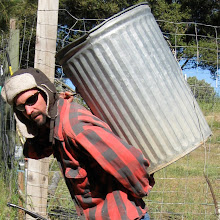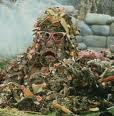
Apparently, Andrew Koppel, son of the stalwart nightline anchor Ted Koppel was "found dead in a NYC apartment." There is something particularly haunting and news-catchy about the phrase "found dead in a NYC apartment." It rings differently than, say, "was in a fatal car accident" or "died in his home surrounded by loved ones" or simply "passed away." Dying in an apartment is not the same as dying in a hospital, "after a long bout with cancer" or at war, "while serving his country."
When someone is "found dead in an apartment" the subtextual tragic message comes through without even going into detail. You think drugs and alcohol, you think about a well-hidden American loneliness. There is no question that when you leave the world in an apartment, you die filed away and "apart from" the world in some strange, tangible way.
The picture painted in my head is a portrait of isolation in the midst of a busy world; a singular lifeless body suspended above a sea of transportation and commerce. A highrise living unit, essentially a box, with a certain definable square footage, becomes, at once, a kind of mausoleum. The phone rings and rings. Emails pile up like electronic laundry. The muffled noises of a sought after cosmopolitan city still clamor on while the dead in their apartments wait to be missed or scented. If Andrew Koppel hadn't have been a Koppel, his unromantic "apartment"passing would not have even made the headlines; he has his dad to thank for this last bit of notoriety.
Andrew Koppell was only 4o years old. I myself have recently turned 40 and suddenly know all too well that sense of being neither old nor young, neither here nor there. It is a state when birth and death seem equally far away and you are lost directly in the middle of a kind of labyrinth. To just up and die at 40 seems like a stark reminder of. . .well. . .I don't know, but it's a reminder of something, I think, as I try to punch this brief message out, loop my belt through my pants and shove off to make a buck.
I find myself asking questions, this morning, that are really, depending on how you look at it, none of my business; like just what went on in that Koppel family anyway? Was young Andrew ignored in some essential way by his amibitous father? Were his other siblings always "better than" him? You see, I have no choice but to ask these questions because I am a father. I have a son who is eight years old and I want to do everything I can to make absoultely sure he doesn't stop breathing in an apartment some day with a head full of Jameson whiskey.
Maybe if Ted had decided against that third news anchor promotion and opted to be, say, the assistant baseball coach instead for his son's little league team back in '77, Andrew would not have been "found dead in a NYC apartment?" As unfair as that sounds, I have to wonder about what impacts, both positive and negative, my own personal amibtions will have upon my family members. There is always the wild card called, "clinical depression" that assures us nothing can be done about brain chemistry and that certain people, regardless of nuture, will end up over-medicated and cold in a highrise mausoleum some day. I am on the fence as to whether the "brain chemistry" argument offers anyone much solace.
And to think it all started when not too old and not too young labyrinthian Andrew noticed someone in a Hell's Kitchen bar on Sunday, that was donning the same kind of straw fedora as he was. "Hey, nice hat!" he was reported to have hollared from his barstool and then he started buying drinks for the guy. It was whiskey straight up for this new brother of his with the same hat on as him. This all, of course, led to keeling over in an apartment later that evening.
But that propensity to be lilted by someone with the same hat as you is so familiar, so childlike, so human that I think I understand Andrew a little. See, my son and I both have these mud-orange shirts that say "Texas" in white block lettering (I bought these shirts in the Dallas airport when I was on my way back home to California last summer after getting my book rejected from an agent who kept looking at his watch during our entire 10 minute meeting). When my son and I wear these shirts at the same time--sometimes on purpose, sometimes by serendipity--there is this unimaginable delight we share.
On the same note, the other day, I was drving through a little hick town (my town) in my '96 Ford truck and someone else drove right past me in the same kind of truck, same year, different color. The guy passing me waved out the window. I waved back and honked the horn, so did he, and for that instant in time, the stranger was my brother, for we had the same truck. It was was almost like, for a flash there, all the little things that separate people from one another seemed to vanish and I felt like buying him a drink.



No comments:
Post a Comment